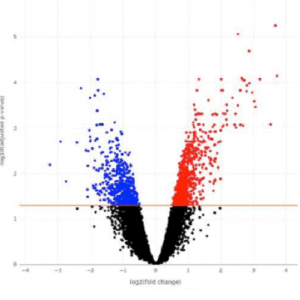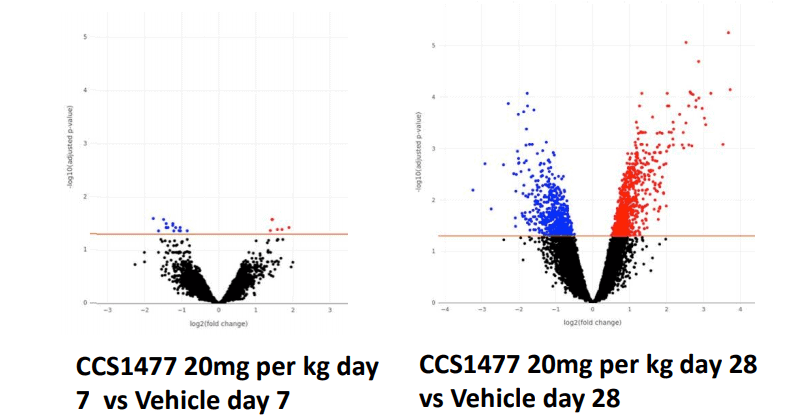Prostate Tumour Study Presented by CellCentric at AACR 2019
- 6th April 2019
- Posted by: Claudine Gabriele
- Categories: Articles, Bioinformatics, Gene Expression Analysis

Fios Genomics’ team performed data analysis for a project with CellCentric. The study was featured in their poster exhibited at AACR 2019 titled “p300/CBP inhibitor CCS1477 targets 22Rv1 prostate tumor AR and c-myc gene expression in vivo“.
CellCentric is a clinical stage biotechnology company focused on the development of the novel drug CCS1477 for prostate and other cancers. Based in Cambridge, UK, they have three different sites focused on research and clinical areas.
Poster Information and Background
Histone acetyl transferases E1A binding protein (p300) and CREB binding protein (CBP) are two co-activators of key transcription factors that contribute to tumour development and progression. One transcription factor, androgen receptor (AR), has been shown to be largely dependent on p300. This dependence is either through direct regulation of AR interaction with promoters of relevant genes or histone modification events.
For advanced prostate cancer, both p300 and CBP are highly expressed – androgen deprivation leads to up-regulation of both proteins. CCS1477, CellCentric’s novel drug for prostate cancer, acts as a selective inhibitor for both CBP and p300. This has previously been shown to inhibit prostate cancer proliferation in vitro and tumour growth in vivo.
22Rv1 prostate tumor cells with both AR and AR variants were transplanted into nude mice during the study. Tumours were treated with CCS1477 for 28 days and the treatment resulted in nearly complete inhibition of tumour growth for up to 24 days after treatment finished. Tumours were taken from both vehicle and CCS1477-treated mice at three intervals (days 7, 28 and 52). mRNA was isolated and gene expression analysis was carried using Affymetrix Clarion D microarrays. Differential gene expression identified a number of genes with fold change between the two tumour types.
AR downregulation was maintained from day 7 to day 52, however three AR target genes recovered once treatment with CCS1477 was finished. Other down-regulated genes included two that provide negative feedback loops – in conjunction with downregulation of AR, this would disrupt circadian gene regulation. KDM3A, a histone demethylase, also had reduced expression. KDM3A is an AR coactivator for key AR target genes.
Overall, gene expression analysis of CCS1477-treated tumours suggests there is an underlying mechanism that involves the inhibition of a number of key drivers of prostate cancer progression.

Fios’ Contribution
Simone Daminelli, Senior Bioinformatician at Fios, was one of the analysts working on the analysis:
“Fios conducted quality control of profiled samples, statistical analysis between drug treatment and control (including various timepoints and drug doses), and pathway analysis. What we found fit with CellCentric’s expectations of CCS1477 and the drug’s mode of action – we were blinded to what the drug was supposed to do, meaning our analysis was not biased towards any ‘expected’ genes or conclusions.”
Interested in finding out more about what we do? Visit our services page now.
The American Association for Cancer Research (AACR) Annual Meeting was held in Georgia on 29 March – 3 April 2019. For more information on the event, visit the AACR website. The AACR abstract for this paper can be found here.
Leave a Reply
You must be logged in to post a comment.

